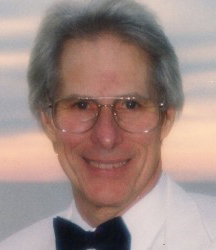Dr. First's contributions include major advances in mammalian in-vitro fertilization, embryo development, embryo cloning of cattle, and nuclear transplantation in embryos. He developed systems of bovine in-vitro embryo production, embryo cloning and gene transfer. Because of his research, there have been major advances in the application of biotechnology to reproduction in farm animals.
His research focused on sperm and oocyte maturation, in vitro production of embryos, cloning of cattle, and methods for producing transgenic embryos. In 1989, he was inducted as a member of the National Academy of Sciences. His work and writing on biotechnology and animal genetics continued until shortly before his death.
He was raised on a farm in Ionia, Michigan where he developed a love of animals and agriculture. After earning his undergraduate degree from Michigan State University, he was drafted into the US Army, serving as a fixed radio signal operator during the Korean War. After the war, he returned to Michigan State University, earned a PhD in reproductive physiology, and accepted a position at the University of Wisconsin-Madison in 1960, where he remained until his retirement in 2005. After his retirement he moved to Starkville, Mississippi, where he was a professor emeritus at Mississippi State University.
Dr. First lectured and taught around the world. When not in his lab, he could be found caring for or riding his beloved horses. He enjoyed running, camping trips with his children, searching for sand dollars on Gulf beaches, and spending time with his family. He was often heard whistling or singing with gusto, if slightly off-key, and loved to dance, especially waltz and polka.
Dr. First received several awards in his life. He received the Upjohn Research Award, the Society for the Study of Reproduction Research Award, the National Association of Animal Breeders Research Award, Animal Science Morrison Award and the Von Humboldt Award. In 1996/7, he received the Wolf Prize in Agriculture which is often called the Nobel Prize for agriculture for his pioneering research in the reproductive biology of livestock.

